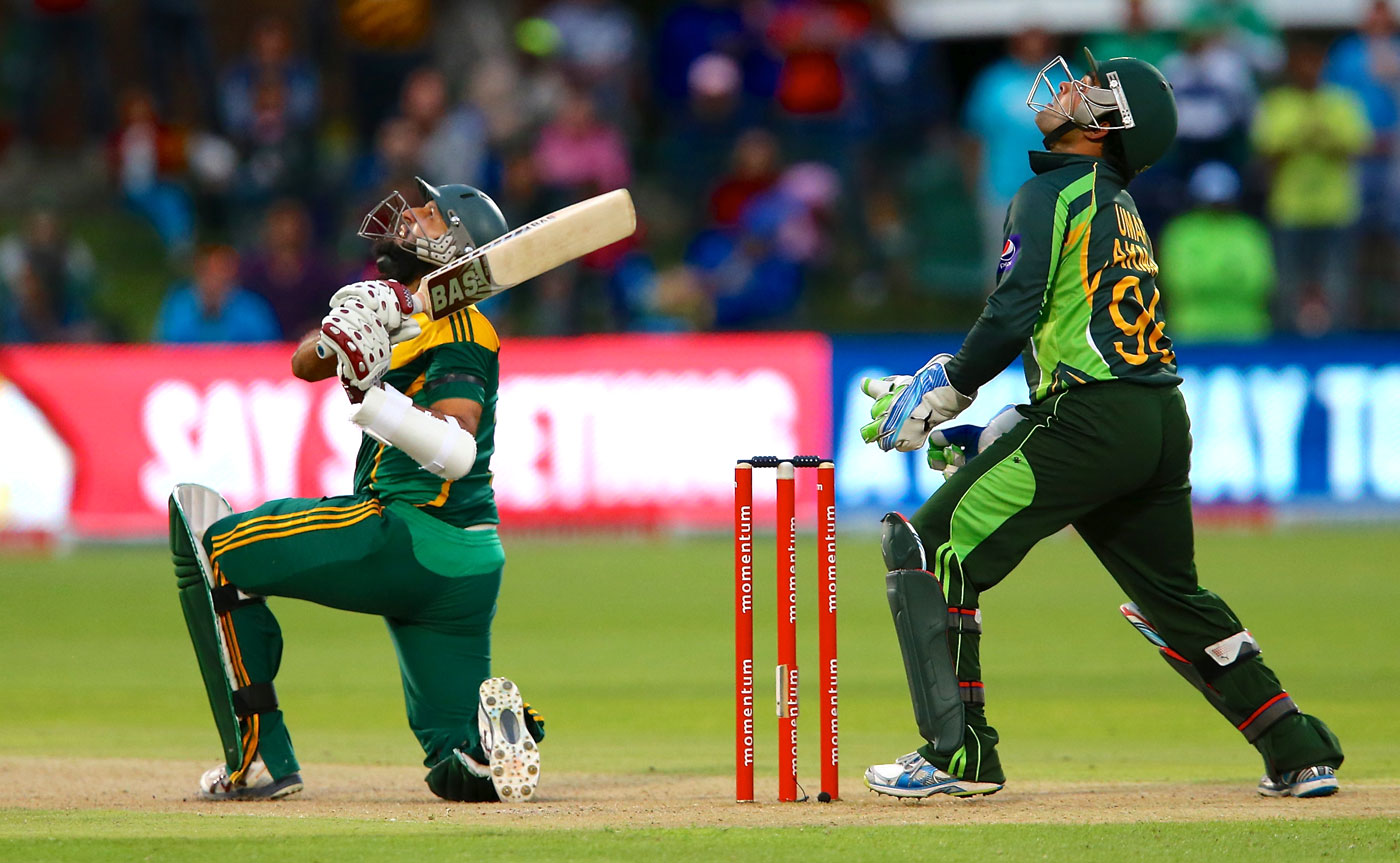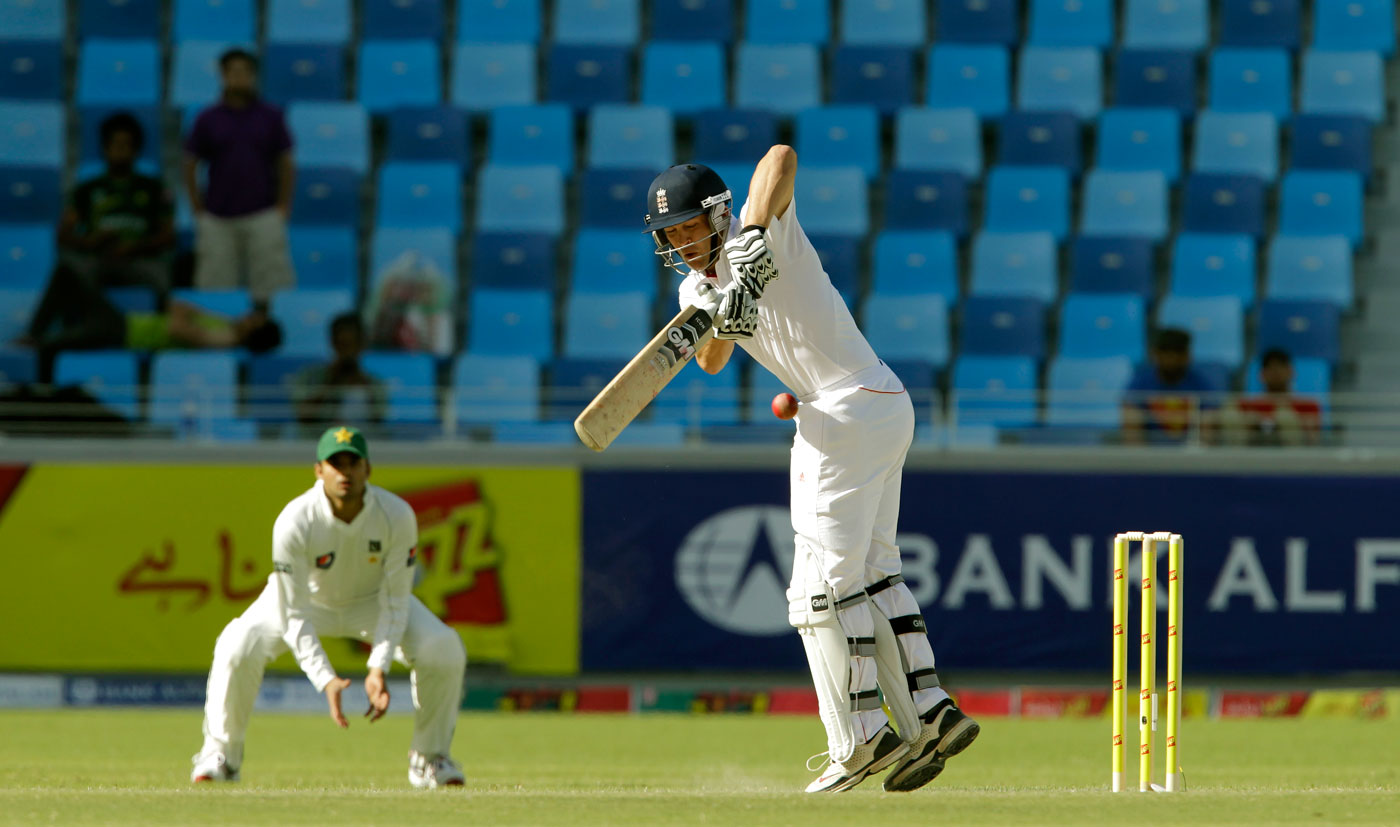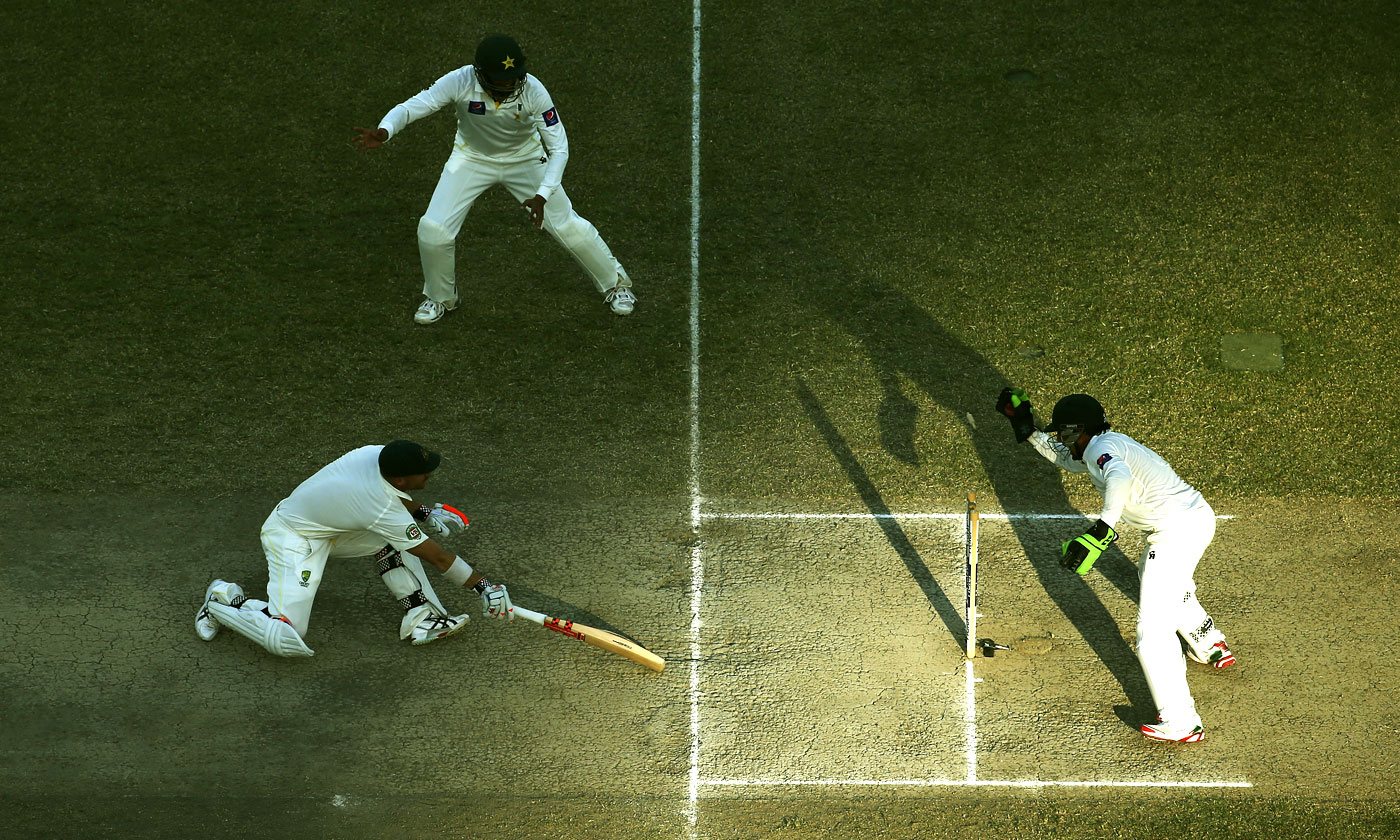The Pakistan captain talks about the many observations, plots and decisions that go into the game's most important task: taking wickets
 Keep calm or Misbah will get you © Associated Press
Keep calm or Misbah will get you © Associated PressTwo sharp short balls, slightly misdirected either side of Stuart Broad's body, sandwiched a yorker in the 102nd over of England's second innings in Dubai. In total, that meant that five of the last six balls Wahab Riaz had bowled to Broad were short. A couple were genuinely hairy, but all were good enough to keep him rooted deep in the crease. Who knows what Broad was expecting fourth ball of that over, but could it have been anything other than a bouncer or a yorker?
Who knows, indeed, what Wahab would have bowled to him - in the end he went with the suggestion of Misbah-ul-Haq. The captain already had a conventional forward short leg in place. He decided to place another - another "silly", he said - in, but finer. He was standing at square leg himself and he told Wahab to bowl a yorker, but a slower one.
"We were attacking him with the bouncer and the yorker, so he was prepared for both," Misbah said a few days later. "His weight was moving back a little and he was prepared for the full yorker. So I felt, if he gets a slower one here, he will get time and his weight will still be on the back foot."
Sitting down, Misbah illustrated the movement he intended to elicit from Broad - a jerky, panicked jab down to the ball, the aim still to prevent it from hitting his toes or stumps but now scrambled by the lack of pace and flight.
"With that weight going back, if you go to play a slower ball inevitably you loft the shot in the air. I took two sillys on that side, one fine, one normal, and the plan was that he would lob to either."
Wahab bowled it just right, the slower ball not looping so much but dipping at Broad's toes with the lazy menace of a paper plane in descent. Broad did exactly as Misbah predicted, half-hopping while hurrying the bat down and lobbing the ball away. It went, with uncanny precision, between the two "sillys", flirting boldly with both, not committing to either.
Because he is a captain who understands so well the angles of the game, and the consequences of tweaking them to tiny degrees, his handling of spinners has mostly suggested he was born for it
Misbah's gambit did not come off, though in the way of unrequited love it was no less powerful for its failure.
****
Misbah-ul-Haq has stood between Pakistan and extinction. He has taken Pakistan by the collar and shaken some calm into them. He is a man of quiet integrity and dignity, of exceedingly stable temperament, and it is in this image that he has built his Pakistan side.
Five years after he became captain, a year after becoming their most successful captain (in terms of Test match wins), and now closer to an exit than ever before, these, bafflingly, remain the popular and intangible ways in which Misbah is spoken about - that is, we speak of his leadership as man, which in its example of him is ample. We hardly talk of his captaincy as cricketer, which is a different thing altogether (see Miandad, J), and when we do, it has swiftly escalated into fractious and tiresome ideological debates about the effect of his batting on his team in ODIs.
Which is odd in one sense because, by most accounts, Misbah is a cricket tragic, nerdily wired into the intricacies of the game. This revelation to Hassan Cheema in a recent profile , for example, from a producer when Misbah was working as a TV analyst:
"For him, every ball was something he needed to see. The only time he stopped watching was when he had to pray, but even then, after he was finished praying he would ask me or someone about every ball: who played the shot, what happened, was it a slower ball - he wanted to know everything. He knew about everyone too, and he read the mind of the fielding captains to perfection. Even as Netherlands were bowling their seventh over he would know who would bowl their 15th over, for example, and he would nearly always be proven right."
The details of that Broad set-up, in fact, Misbah had voluntarily divulged, and in typical Misbah fashion. At the post-win press conference, he had first put on his Misbah face (find wall, stare at wall, answer wall) and spoken in the generalised way about the game that these interactions require. Then, as often happens, he exited the stage, to be encircled by a group of journalists. It is here, usually, that he talks with surprising candidness and more specifically about the game. I asked him about another dismissal that day, which he talked us through, before he asked whether we had noticed the slower ball to Broad.
 Give Hashim Amla "a doosra from middle and leg" © Getty Images
Give Hashim Amla "a doosra from middle and leg" © Getty ImagesA few days later, on the second evening of the Sharjah Test, we sat down to discuss this and the other granules that make up the real substance of a captaincy. England were establishing a loose - and ultimately brief - sense of control over the game and it had been a long day. Misbah looked a little more haggard than usual. He had hemmed and hawed when I first mentioned the idea of the interview, worrying whether, in the middle of a Test, he would be able to summon enough such instances from such a long tenure. But he had agreed to meet and as it turned out, remembering was not a problem. Most of what he recalled was recent but had there been more time, I can imagine him remembering decisions he made in the tape-ball games of his youth.
****
The Bairstow wrong'un
On the same day as the Broad near-miss, Yasir Shah bowled Jonny Bairstow with a googly and ran straight to Misbah to celebrate, acknowledging his captain's role. Until then, Bairstow had played Shah securely, including three full overs late on the fourth day. On the fifth he again looked fairly confident, both in leaving and playing him with the bat. Shah came at him from both sides, and especially when he was over the wicket, Bairstow was recognising and leaving legbreaks pitched outside off so well, each leave carried the force of a firm-intentioned stroke. The googly was observing purdah.
The guiding force of Misbah's on-field captaincy is a deep grasp of the mechanics of batsmanship. It is an acuity that the greatest are sometimes unable to articulate; perhaps because Misbah operates so resolutely within his limitations, he recognises the boundaries within which opposing batsmen operate in different circumstances, as well as, of course, the overarching fragility of batting as a task.
"What was happening, actually, the legbreak that was coming on middle he was playing pretty easily. The one outside off, he had clearly made a plan that he was going to stretch out far forward and then leave it. He was leaving it well.
"Sometimes you see when a batsman is set on a plan, you want to mess with his mind a little. You see patterns, so you want to make him play differently, when there are chances of mistakes"
"As a batsman when I am doing this, if suddenly from the same line from where I am leaving I get a googly, even if I know it is a googly, the chances of my making a mistake are high. Even if you recognise it, because the intention from that line is to not play it - mentally you have planned you are going to leave it. Suddenly from there when it is a googly, you decide to try and play, you can still miss it. I said to Yasir, 'Bowl him two to three googlies in a row so that the intention he has to leave the legbreak from that line [is affected].'"
Shah bowled him the first googly that day and from how Bairstow shaped to play it he had clearly picked it. But having gotten used to leaving, or just defending, suddenly another option of scoring through the vacant midwicket - Misbah had a gully instead - affected the execution. That it happened off the very first googly was a bonus.
Tying up Hashim Amla
In the field, all captains work to one end: wickets. It's just that their approach to the cost of getting them - runs - is different. Some, like Michael Clarke, are willing to give up a few more. To Misbah, runs are gold dust. He hates conceding them, whatever the situation. He plans for wickets by not giving away runs, not by setting unusual fields or asking his bowlers to do anything fancy or cute.
It is an instinct that served him well in what he says is the one moment of captaincy he will never forget. It came at the death of an ODI in Port Elizabeth in 2013. South Africa, with Hashim Amla and JP Duminy at the crease, needed less than a run a ball from the last two overs (11 off 12). Misbah had Saeed Ajmal and Junaid Khan and it was the penultimate over from Ajmal that won it.
He remembers every detail because he talked Ajmal through the entire piece, but not exactly in its right place: he was off on the chronology of the over.
"Amla was on 97, Saeed was round the stumps. He asked me, 'What should I do?' I said, 'First ball, a little outside off, he will wait for the ball, push to covers and take one.' Back foot he will go to play there. So I said to him, make sure you finish on off stump, your offbreak, don't bowl the doosra. Don't bowl to middle and leg, bowl the offbreak on off so that if he moves to play it there, if it is a little slow, he will not get pace and he'll be waiting for the doosra. There is a chance that he does not get a single there. He wants a single, so try not to give him anything on his legs, or outside off."
 To Jonathan Trott, "bowl short of length and either cramp him, or just outside off" © Associated Press
To Jonathan Trott, "bowl short of length and either cramp him, or just outside off" © Associated PressMisbah mistakenly remembers the first four balls as dots. Amla tucked the first ball, on middle and leg, to midwicket for a single. What Misbah remembers as the last ball of the over, to Duminy, was actually the second ball, though in instruction to Ajmal he was correct: "Last ball Duminy was there. Saeed said, give him a deep midwicket as he will sweep it, so I will bowl off stump. I said, he will sweep from outside off. Midwicket is up, just bowl him a straight offbreak, a bit quicker. If it stays straight he could be leg-before, if he hits it, he hits it." He tried to sweep and missed it, a dot ball.
Duminy got a single off the next, bringing Amla back on strike, on 98, three balls left in the over. The fourth was a dot, Ajmal following Amla's movement as he backed away. The fifth was the original plan, though probably a little wider than intended. Amla still couldn't get it away.
"He panicked a little, nine needed and it was ball to ball, the panic button was on. Saeed can also panic, of course. So I said to him, if I was a batsman at this stage, I would not be looking for a single, I will look for a boundary, a big shot. Because nine runs off eight [actually seven], however big a batsman, he is under pressure now.
"Now he will not try to hit over cover, he will go for a big shot. So I said, now you have to give him a doosra from middle and leg, because now he will hit it. He bowled it and Amla skied it straight up [to be caught halfway to the boundary]."
Pakistan won eventually by a run, sealing a first ODI series win in South Africa and the first by a subcontinent side in the country.
Fast, slow?
No Pakistani captain has relied as heavily on spin as Misbah, not even Miandad, who, usually in Imran's absence and at home, was happy to rely on them. Fifty-nine per cent of the wickets taken under Misbah have been by spin; 58% of the overs bowled by spinners. In that, he is an outlier among Pakistan's major captains. Corresponding percentages for Abdul Kardar, Imran and Miandad are, in order: 23% of wickets and 33% of overs; 29% of wickets and 36% of overs; 46% of wickets and 48% of overs.
Sitting down, Misbah illustrated the movement he intended to elicit from Broad, a jerky, panicked jab down to the ball, the aim being to prevent it from hitting his toes or stumps but now scrambled by the lack of pace and flight
To a degree it has been thrust upon him by circumstance: as much by the attack that was left to him once he took over as by the surfaces on which Pakistan played "home" Tests. Had he the Mohammads, Amir and Asif, who knows how his captaincy would have played out. But because he is a captain who understands so well the angles to which the game is played, and the consequences of tweaking them to tiny degrees, his handling of spinners has mostly suggested he was born for it.
He insisted he is as comfortable with fast bowlers, though he let slip a perhaps natural caution in expanding: "If a guy is bowling with control and he knows where the ball is going and how much it is swinging, then it becomes easy. It becomes difficult when the ball is not being controlled, or it is swinging both ways too much, or if he is struggling with line and length."
Control - not conceding runs - is vital to Misbah and it is his spinners who have always given him utmost control. Consequently, in the absence of Asif and Amir, and other than in a few phases, Misbah has sometimes come across as intrinsically untrusting of fast bowlers. He was, for instance, so despondent at the prospect of playing three fast bowlers in the first Test against England last month (Shah was injured, with no back-up) that it felt as if he had conceded the Test before it even began.
He has had his moments with them, though. He remembered the dismissal of Dinesh Chandimal in the second innings of the famous Sharjah Test last year. Mohammad Talha had bowled especially well on what was basically a strip of quicksand, and was brought into the attack with a 38-over-old ball. Misbah, at mid-off, had been watching Chandimal grow in confidence and told Talha to bowl a bouncer into his body. Talha did and Chandimal awkwardly ducked under it. He bowled a length ball outswinger next, which Chandimal left.
"Now he says, next ball I will bowl another outswinger. I said, 'Outswing and bouncer he is ready to leave. So from some way out, bring the ball in a little to get him to play a forward defensive.' It was reversing a little. I thought because of the bouncer, his weight will stay back a little. He will not come forward properly or fully. If you land it on a good spot, even if there is a tiny gap, he's gone."
It went as Misbah said, though it was helped by the size of the gap Chandimal left. (It is worth noting the degree to which Misbah can be involved in constructing overs, ball by ball, with his bowlers.)
 Fifty-nine per cent of the wickets taken under Misbah have been by spin © AFP
Fifty-nine per cent of the wickets taken under Misbah have been by spin © AFPA bigger tapestry to draw upon is Pakistan's working over of Jonathan Trott in the UAE. In a Test series marked by the control Pakistan's spinners exerted over England's batting, Trott being dismissed by pace in three innings out of six was almost anomalous (and more so than for anyone else in the top seven). Sure, at one-down he was always likelier to face fast bowlers than others but there was an undeniable pattern to the dismissals. Misbah and Pakistan had picked up on an imbalance in the Trott shuffle.
"He plays on the move lots and the shuffle was always towards off stump and a little moving forward. The back foot does not go back and across, it moves up a little. It is a different shuffle, so the ball that is pulled wide a little, he tries to drive it, he tries to get close to it.
"Whenever you bowl outside off to him, short-of-a-length ball, he will be on the move, weight going forward, and that gives you a chance. If you give him one towards his body [motions at his ribs], he will be playing that. Sometimes when he moved forward to try and play to leg, he would be a leg-before shout, and he hit so many through midwicket. So we noticed and thought that because he walks towards off, we bowl short of length and either cramp him [at his body], or just outside off. Only the odd ball towards pads. But however much he walks out, you pull him even further so that he plays on the move. We knew spin was our strength, but with him we thought, he will chase a ball outside off, or even a short ball past his ribs."
Trott's three dismissals to pace: the first, moving across and strangled down the leg side to a short ball; the second, chasing a short-of-length delivery far outside off; and the last, leg-before to one swinging into his pads. Trott's technical troubles with the short ball came to wider attention in 2013, in encounters with Mitchell Johnson, and it ended his career. But in the relative anonymity of Dubai, long before, Pakistan had already worked him out.
****
After a while Misbah was recalling all kinds of little plans and plots without prompting. Each time there was a conversational pause, on the verge of blossoming into an awkward silence, he thought of another, like the two dismissals of Alastair Cook in the second Test in Dubai.
To Misbah, runs are gold dust. He plans for wickets by not giving away runs, not by setting unusual fields or asking his bowlers to do anything fancy or cute
As with the Bairstow googly, they revealed Misbah's understanding of batsmanship but also a mental nimbleness. The plan was for Shah to attack the rough from round the wicket to Cook, with a man at 45 for the sweep. But Misbah sensed at one point that Cook was well set - "paka hua hai" - so he brought in a leg slip and Shah went over. Cook was gone almost immediately, caught there by Ahmed Shehzad.
In the second innings, he reversed it. Shah began at Cook from over the wicket. But during the drinks break before his next over, Misbah asked him to switch, to what was their original first-innings plan. "I said, 'Bowl to him from round, where he plays well.' Yasir said, 'No, this is our plan, this is what we stick to.' My thinking was that the sweep is his pet shot, he has confidence in it. But this is a fourth-day pitch, the rough is greater, he will hit but he might top-edge. As soon as he went there, he top-edged.
"Sometimes you see when a batsman is set on a plan, you want to mess with his mind a little. You see patterns, so you want to make him play differently, when there are chances of mistakes."
One of the more striking descriptions he used was for the body position he wanted to force David Warner into, in the second innings of the Dubai Test last year. Warner scored a hundred in the first and was playing well in the second. Misbah told Zulfiqar Babar, with a relatively new ball, to go round the wicket, convincing him to leave cover vacant. "From this angle if you bowl middle, you'll get drift and baazoo nahin khulenge [his shoulders won't open fully, or move freely] while trying to force a shot. He tried to do exactly that, to force one through covers, missed it - ball went with the angle straight past him and he got stumped."
 Shoulder-charged: in Dubai last year David Warner was stumped from a delivery bowled round the wicket and pitched on middle stump © Getty Images
Shoulder-charged: in Dubai last year David Warner was stumped from a delivery bowled round the wicket and pitched on middle stump © Getty ImagesNone of this is to paint Misbah as a unique and extraordinarily innovative tactician. Captaincy doesn't work to such simple descriptions. His reading of batsmen is notable, but most captains would - or could - make some of these moves. And any captain still has to have the bowlers to succeed.
If anything, an alternative (and not incorrect) interpretation would be that Misbah is extremely fortunate in having the bowlers he has had. Nor is he a solitary decision-maker. Ideas come from unexpected places. In Pallekele this summer, Misbah pointed out, it was Shan Masood who suggested bowling Azhar Ali at Dimuth Karunaratne in the second innings, because his googly would trouble him. Azhar had Karunaratne stumped - off the googly - and he took another wicket next ball, fortuitously, for good measure.
But Misbah is rare in the tradition of Pakistan captains, in that very few will recall and then want to talk about such details. Miandad, maybe Mushtaq Mohammad; and Miandad will segue effortlessly into a list of all the injustices enacted upon him. And also, it is worth reminding ourselves that being calm and equanimous doesn't win matches, not directly anyway. It doesn't make you your country's most successful captain. It is these moves, made every few overs, sometimes every few deliveries, that are the real debris of a captaincy.
No comments:
Post a Comment